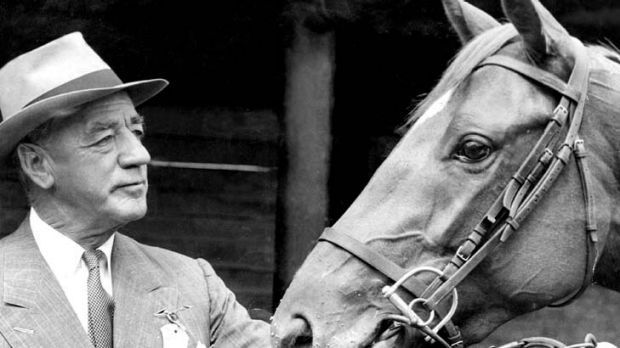GEORGE WIGG & STANLEY WOOTTON
SAVIOURS OF EPSOM DOWNS

Stanley Wootton
In 1906, Richard Wootton, an Australian and South African racehorse trainer, came to Epsom with his sons, Frank, aged 13 and Stanley, aged nine. After opening a stable at Treadwell House, Epsom, his sons served their apprenticeships with him and although not as successful a jockey as his brother Frank, in 1910, Stanley won both the Chester Cup and the Northumberland Plate on Elizabetta.
Serving as an officer in the Royal Fusiliers, in the 1914-18 war, Stanley was awarded the Military Cross. The war over, he took the reins from his father at Treadwell House, training around 25 of his own horses with the sole purpose of landing betting coups. So successful was he, that in 1925, he bought Epsom’s Walton Downs for £35,000, simultaneously taking a lease on the Winter Gallops, within the racecourse.
In 1969, Stanley Wootton generously offered the Horserace Betting Levy Board the Six Mile Hill gallops on Walton Downs on a 999-year lease, so ensuring their preservation as training grounds.
George Wigg was born in Ramsdell in Hampshire in 1900, and from winning a scholarship to Queen Mary’s Grammar School in Basingstoke, he joined the Army, serving in the Royal Tank Corps from 1919 to 1937.
On the outbreak of World War II, he re-enlisted in the Royal Army Education Corps and in 1945, became Labour MP for Dudley under Clement Attlee. From serving under Harold Wilson he left Parliament as Baron Wigg of Dudley and thereafter, from the House of Lords and as Chairman of the Horserace Betting Levy Board (from 1967), he, together with Stanley Wootton set about protecting the future of Epsom Downs Racecourse.
 Fast forward now to May 1982, the time when the Epsom and Walton Downs Conservators Act Bill came up for debate. Lord Wigg in proposing an amendment to control the use of the Downs by hack riders, shrewdly foresaw that if Epsom ceased as a training centre it would be the death knell for the Derby, and so objected to the proposal that hack riders “go where they liked, when they liked, and how they liked.”
Fast forward now to May 1982, the time when the Epsom and Walton Downs Conservators Act Bill came up for debate. Lord Wigg in proposing an amendment to control the use of the Downs by hack riders, shrewdly foresaw that if Epsom ceased as a training centre it would be the death knell for the Derby, and so objected to the proposal that hack riders “go where they liked, when they liked, and how they liked.”
Clearly, if his amendment was accepted “it would establish the rights of the trainers; under properly controlled conditions training and racing would continue, and money would be available for the development and conservation of the downs free of any charges on the public.”
Lord Wigg continued, “You cannot have all-weather gallops being used by valuable racehorses, running with a few inches or yards of people on hacks. To do that is to invite disaster.”
Memorably, Lord Wigg’s amendment was carried by 92 votes to 33.
Day’s after the completion of the transfer of the lease on Walton Downs, Lord Wigg said,
“I stood up there and I looked over that marvellous hill and over the trees on Walton Downs and there was Headley Church standing up tiny against the sky, and I thought, ‘Why not for ever?’ and by God we’ve done it.”
Since then, a memorial viewing point has been erected on Epsom Downs in recognition of the work of Lord Wigg and Stanley Wootton, for the preservation of the Downs.